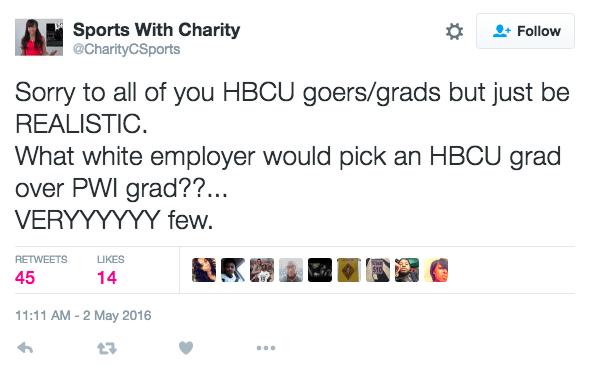Is There Any Truth to This HBCU Vs. PWI Employment Debate?
Charity Chambers really stepped in it Monday. With just one post to Twitter, the Texas local TV producer ignited a so-called "HBCU vs. PWI" discussion by suggesting that white employers are turned off by students with degrees from historically black colleges and universities.
(For the uninitiated, PWI is short for "predominantly white institution.")

"Sorry to all of you HBCU goers/ grads but just be REALISTIC. What white employer would pick an HBCU grad over PWI grad??... VERYYYYYY few," Chambers tweeted via her handle @CharityCSports. The account had been disabled Monday afternoon after HBCU graduates flooded its mentions over the comment; "HBCU" was also a top 10 trending topic into the afternoon.
It's unclear what prompted the tweet. But it's part of a long-standing debate about the value of degrees from HBCUs for African-American graduates entering the workforce.
There is also no reliable data or academic study to support such a claim. There is far more evidence showing that employers have discriminated against applicants with ethnic-sounding names — it's a form of racial prejudice that has often been cited to explain African Americans' chronically high unemployment rate compared to the rate for whites.
In March, the unemployment rate for blacks was 9 percent. The rate for whites was 4.3 percent, according to the Bureau of Labor Statistics.
Here are a few reactions to Chambers' tweet:
Do you know how many HBCU grads work in your industry? It's quiet for you, sis.
@CharityCSports Next time, think wisely and mind what you tweet, sis. In truth and service, A proud @HowardU alum.
@CharityCSports The executive director for development and diversity/senior producer at @CBSNews is a @FAMU_1887 alumna. Girl, bye.
@CharityCSports A Degree is a Degree as long as the School is accredited. ..You believe White is Better that's your ideological truth
@CharityCSports Also fyi going to an HBCU is irrelevant when it comes to white applicant vs. black applicant in many instances.
Sev eral Twi tter us ers w onde red if the deba te was act ually started by the announcement that the eldest da ughter o f Barac k and Michelle Ob ama, Malia , would attend Harvard University after taking a gap year.
Some wondered if Malia should have chosen an HBCU.
People are really mad that Obama didn't send his daughter to an HBCU? Goodness gracious.
Realistically, I want to know if the Obama's even spoke to their children about HBCU's.
Others weighed in expressing disappointment that the discus sion was h appening at all.
Lord. I see the HBCU v. PWI debate on my TL.pic.twitter.com/kpCcBmMqYI
Watching people say HBCU students don't get hired likepic.twitter.com/4xest5sh1d

